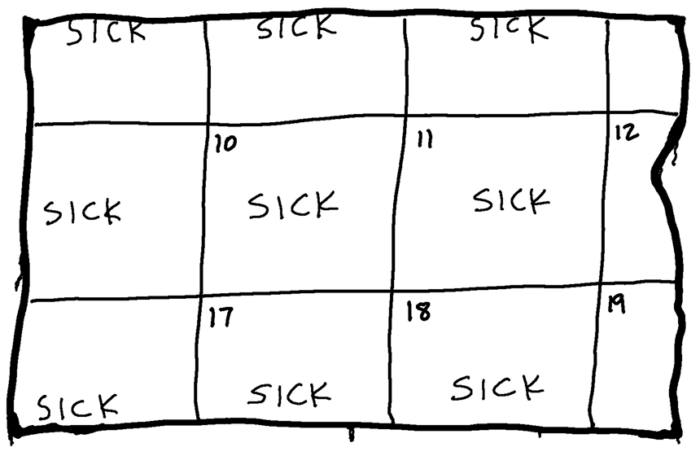I did most of my reading yesterday in the bathtub. I’m an avid bath reader to begin with, but I’ve got a case of the flu that keeps giving me the chills, so I’ve been making a bunch of bubble baths to help raise my body temperature.
The last couple of weeks have been tough on my physical health. I had some kind of stomach bug last Wednesday (“stomach bugs” are almost always food-borne illness) and this week a flu has literally decimated my school. I’m staying hydrated, eating saltines, and bathing more than that chick from Splash.

(I know her name is Daryl Hannah. Every guy my age knows her name is Daryl Hannah, but I thought it’d be cooler if I seemed nonchalant about it.)

Marco Polo has just crossed the Gobi desert and relayed the tale of a village where husbands let their wives sleep with visitors who pass through. (It’s called “being a good host.”) The government told the people of the village to stop it because that was weird, but the villagers wrote a letter saying, “Please, please, please let our spouses sleep with strangers; it’s tradition!” and the government responded by saying, “Oh, alright. Fine. You guys can keep boning vagrants. Who are we to stand in the way of tradition?”
The Travels of Marco Polo makes me think about travel, naturally, but particularly the way most Americans tend to blast through their trips like they’re trying to speed-run Paris. For us, travel is full of maps and time tables and lists of all the things we have to do and see and eat. A lot of us come back from vacation more exhausted than we were when we left.
This wasn’t the case for Marco Polo, though. Marco Polo traveled around the Silk Road and China for about 24 years. That’s about a third of his life, and he wasn’t living it all go, go, GO! He would stay in one place for quite some time, and it’s not easy to understand what that is like.
In one scene, Marco Polo talks about these hills that are so pleasant and beautiful and bountiful that people go up there when they’re sick and are (as if by magic) healed. Marco attests to the healing properties of the area by saying that he’d been sick for about a year but got better once he saw how cool those hills were.
Sick. For a year.
More so than the magic of that particular hillside, the interesting thing to take from this is that Marco Polo didn’t see what he was doing as some kind of trip or vacation. It was just life. He wasn’t rushing around trying to knock the Taj Mahal off his checklist; he was more akin to a nomad. His home was the road.
And what a lifestyle! I don’t know if I’m jealous of him — he was ill for a whole year of this journey, after all — but it’s fun to imagine what life would be like if you just … didn’t have a permanent residence.
Are there still people in the world who live like that? Other than, like, you know, homeless people?
